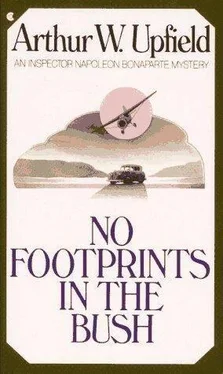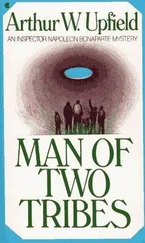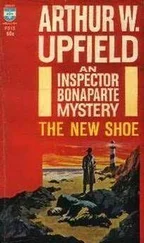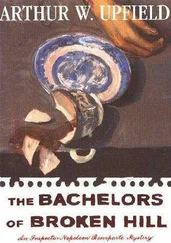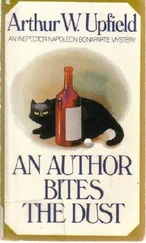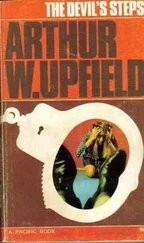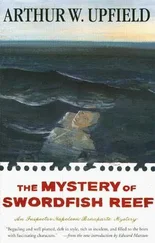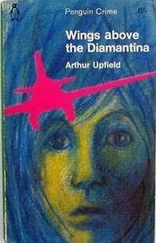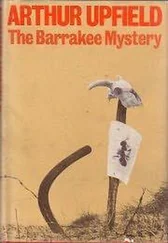Arthur Upfield - No footprints in the bush
Здесь есть возможность читать онлайн «Arthur Upfield - No footprints in the bush» весь текст электронной книги совершенно бесплатно (целиком полную версию без сокращений). В некоторых случаях можно слушать аудио, скачать через торрент в формате fb2 и присутствует краткое содержание. Жанр: Классический детектив, на английском языке. Описание произведения, (предисловие) а так же отзывы посетителей доступны на портале библиотеки ЛибКат.
- Название:No footprints in the bush
- Автор:
- Жанр:
- Год:неизвестен
- ISBN:нет данных
- Рейтинг книги:5 / 5. Голосов: 1
-
Избранное:Добавить в избранное
- Отзывы:
-
Ваша оценка:
- 100
- 1
- 2
- 3
- 4
- 5
No footprints in the bush: краткое содержание, описание и аннотация
Предлагаем к чтению аннотацию, описание, краткое содержание или предисловие (зависит от того, что написал сам автор книги «No footprints in the bush»). Если вы не нашли необходимую информацию о книге — напишите в комментариях, мы постараемся отыскать её.
No footprints in the bush — читать онлайн бесплатно полную книгу (весь текст) целиком
Ниже представлен текст книги, разбитый по страницам. Система сохранения места последней прочитанной страницы, позволяет с удобством читать онлайн бесплатно книгу «No footprints in the bush», без необходимости каждый раз заново искать на чём Вы остановились. Поставьте закладку, и сможете в любой момент перейти на страницу, на которой закончили чтение.
Интервал:
Закладка:
That the pilot had flown here with the specific intention of destroying a car and its driver was as evident as the shade cast by the trees. Doubtless the pilot had watched the car crossing the plain. He knew, without doubt, just where the road crossed the hill range, and before making his attack he had flown over the road for many miles towards Shaw’s Lagoon to be certain there were no travellers upon it who would observe his subsequent act, or see his machine, and afterwards connect it with the destruction of the car.
The only cover near the road for many miles was that provided by the grove of cabbage-trees, and, to make doubly sure he would escape observation from a chance traveller camped in the shade of the trees, he dropped his bomb among them.
Bonaparte was tempted to run from the trees down to the blazing wreckage. To have succumbed to the temptation would have been stupid. For one thing, the car had come to rest at least half a mile from him; and for another there was no possible chance of rescuing its occupant, who must have died from the exploding bombs.
Having partially recovered from the surprise and stunning effect of the “exploratory” bomb, Bonaparte thrust the letter into a pocket and leaned back against his swag to watch and wait. There was more than a hint of determination that none should escape the attack on the car as the aeroplane continued to circle low above what was a mass of blackened metal, enveloped by fire. For several minutes the plane circled. Then the pilot turned the machine westward, skimmed a hill-top and vanished from Bonaparte’s vision.
Without movement, Detective-Inspector Bonaparte listened until he could no longer hear the sinister noise controlled either by a maniac or an ice-cold killer. The silence that had preceded the arrival of the two crows returned.
Bonaparte went down to the wreckage, lying on its side. The door in the top side was still closed, but no glass remained in it or the windscreen. The tyres were burned away. He could not get near enough to peer through the distorted steel skeleton to ascertain how many people had been inside.
Still with taut nerves and governed by a most natural horror, Bonaparte walked up the hillside, following the trail made by the blazing car. He had no hope of finding anything identifying the driver, for he had seen nothing detached from the vehicle during its descent, and now not even its numberplate was decipherable. Nevertheless he was mistaken; for, a few feet up the hillside from the place where the car had been bombed, he found a small leather attache case, on which the embossing remained to tell that its owner was Sergeant A. V. Errey. This jetsam, freakishly preserved from explosion and fire, wasall the searcher found.
With hearing still tensed to receive the noise of an approaching aeroplane, Bonaparte stepped down to the road and slowly walked along it to the cabbage-trees, the case tucked under an arm. His mind was concentrated on the mysterious purpose of the outrage. It was a time when his eyes were much less active than normal, so much so that he came within two yards of the camp before his mind accepted the motionless shape of the tall, grey-haired, clean-shaven aborigine standing just within the edge of the trees’ black shadow.
The man’s physique was magnificent. His age was probably less than fifty. He wore no vestige of clothing save the pubic tassel, arm bands made of kangaroo fur and a forehead band to which was glued white birds’ down and which raised his hair to a plume of grey web. In his left hand he carried a spear having a fire-hardened point, and in the right a heavy club fashioned from a mulga root.
“Hullo!” exclaimed Bonaparte, compelled to look upward into the expressionless face. “Who are you? What your name, eh? How you bin called?”
Clearly, without accent, in English came the reply.
“I am the Chief of the Wantella Nation. I am Writjitandil, meaning Burning Water. This is the Land of Burning Water.”
Black eyes opened wide, and in them blazed red anger. Bonaparte had spoken with superiority. Now he heard masterful pride in the voice of this naked black man.
“Who are you, half-caste? What is your business in the Land of Burning Water? Tell me, quick.”
Swift movement of a sinewy arm followed the demand. The long spear became horizontal, its point aimed at Bony’s heart.
Chapter Two
Chief Burning Water
THERE are men of every colour and race who stand high above their fellows by reason of the greatness of spirit lifting them to positions of leadership. In the affairs of the aboriginal tribes of Australia, no less than in the affairs of the allegedly more civilized white and yellow people, such men are found.
This was Burning Water. There was no mistaking the quality of leadership in his poise, in his facial expression, and especially in his eyes. Bony instantly realized that he was confronted by no ordinary aborigine. He saw with clear vision his own standing based on his unfortunate birth, saw clearly how he appeared to this regal man, and knew himself physically inferior.
“I am waiting,” said Chief Burning Water, no whit abashed by the steady stare in Bonaparte’s blue eyes, the lithe cat-like stance of the man born of a black mother and a white father, dressed neatly in serviceable bush clothes, veneered heavily with the white man’s civilization. He saw only a despised half-caste, fruit of a woman who had broken a law.
“Put down your spear and we will talk. You are standing in my camp.”
“I stand on my own land, not your land.”
“Yet you are in my camp. However, you are welcome. Put down your spear, and we will make a fire and talk!”
“There is no time for frills, half-caste. You were here when the aeroplane destroyed Sergeant Errey’s car and killed him. I saw it done. I saw you go down to the wreck. I saw you track up the hill to the road. I saw you pick up the Sergeant’s dillybag. You have it now. All this happened in the country of the Wantella Nation. Further, you travel alone, and you walk when a man would ride a horse or a camel or drive a car or truck. Sergeant Errey was a good white man. Talk.”
There was no mistaking the unbreakable will in the black eyes boring into his, and yet Bony without haste unbuckled his belt and removed his shirt and singlet. Then, turning his back to Burning Water, he said, speaking over his shoulder:
“Would you drive your spear into the sign of the square and the moon when it is full? I have stood on the square of squares facing the east and the full moon. My tribal father is called Illawalli, and he lives beside the northern waters. He has spoken to me of the Wantella Nation.”
As Bony turned again to face Burning Water, the Chief’s spear and club were dropped to the ground, and he advanced with his hand out-stretched:
“You bear the sign on your back of the great ones among us. I, too, have it on my back. I, too, have spoken with Illawalli who is as superior to me as I am to the tick on a cockatoo’s back. Your name?”
Bonaparte now was smiling upward into the smiling face of Chief Burning Water.
“I am known as Bony,” he replied. “I am on my way to visit Mr Donald McPherson, and to look for the cause of strange happenings reported from the Land of Burning Water-your land. I have seen a strange happening today. So let us make a fire and talk.”
Bony put on his vest and shirt. He combed his hair and put on his felt hat. Burning Water picked up his club and spear, with the latter pointing downward to the gully. Bony turned and saw advancing up the bed of the gully towards the burned out car a party of nine aborigines.
“They are of the Illprinka Nation,” Burning Water explained. “They have come from the great desert country towards the west, and not for years have they been friendly. We are but two: they are nine. We have seen what we should not have seen. We must go, quick and fast.”
Читать дальшеИнтервал:
Закладка:
Похожие книги на «No footprints in the bush»
Представляем Вашему вниманию похожие книги на «No footprints in the bush» списком для выбора. Мы отобрали схожую по названию и смыслу литературу в надежде предоставить читателям больше вариантов отыскать новые, интересные, ещё непрочитанные произведения.
Обсуждение, отзывы о книге «No footprints in the bush» и просто собственные мнения читателей. Оставьте ваши комментарии, напишите, что Вы думаете о произведении, его смысле или главных героях. Укажите что конкретно понравилось, а что нет, и почему Вы так считаете.
